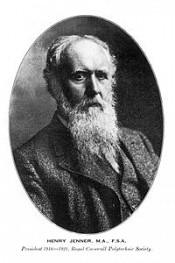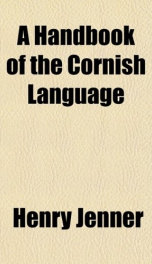Jenner Henry

Henry Jenner FSA (1848-1934) was a Celtic scholar, Cornish cultural activist, and the chief originator of the Cornish language revival. Jenner was born at St Columb Major on 8 August 1848. He was the son of Henry Lascelles Jenner, who was one of two curates to the Rector of St. Columb Major, and later consecrated though not enthroned as the first Bishop of Dunedin and the grandson of Herbert Jenner-Fust.[1] In 1869 Jenner became a clerk in the Probate Division of the High Court and two years later was nominated by the Primate at Canterbury for a post in the Department of Ancient Manuscripts in the British Museum, his father then being the Rector of Wingham, a small village near Canterbury. His earliest interest in the Cornish language is mentioned in an article by Robert Morton Nance entitled "Cornish Beginnings", [2] In 1874 Henry Jenner continued his interest in Celtic languages, and in 1875 he read a paper to the Philological Society in London, his subject being the Manx language. The following year he read another paper on the subject of the Cornish language at Mount's Bay. In 1877 he discovered, whilst working in the British Museum, forty two lines of a medieval play written in Cornish around the year 1450. In 1903 he was made Bard of the Breton Gorsedd, and along with L.C.R. Duncombe-Jewell he jointly founded the first Cornish language society, "Cowethas Kelto-Kernuak". The following year Jenner and Duncombe -Jewell took Cornwall's application for membership of the Celtic Congress, then meeting in Caernarfon. His Bardic name was Gwas Myghal ('Servant of Michael'). Shortly afterwards he published his Handbook of the Cornish Language and the Cornish Revival was born. His version of Cornish was based upon the form of the language used in West Cornwall in the 18th century, although his pupil Robert Morton Nance would later steer the language revival towards mediaeval Cornish. At a time when many people thought the Cornish language had died Jenner observed [3] and here in another passage from the Handbook of the Cornish language, Jenner gives the following view A tory and a committed Jacobite, Jenner and his wife were involved with the Order of the White Rose (OWR), a society of Stuart sympathizers of which he was chancellor, conducting the order's rituals. (The Jenners first visited Scotland in 1892, and Scots Gaelic was one of his many languages.) He also actively supported The Royalist, a journal which ran from 1890 to 1905, and organized several exhibitions at the New Gallery, Regent Street, including the Stuart exhibition in 1889: it was said that Queen Victoria snubbed him because of the legitimist views promoted by these exhibitions. He withdrew from active involvement with the OWR before the First World War but remained fervently royalist and right-wing. After working at the British Museum for more than forty years[1], in 1909 Jenner and his wife Kitty[4] retired to Hayle, his wife's home town, and in January 1912 he was elected as the Librarian of the Morrab Library, a post he held until 1927. He also served as President of both the Royal Cornwall Polytechnic Society and of the Royal Institution of Cornwall.[5] Jenner had married Kitty Lee Rawlings, herself a novelist and writer on art,[1] in 1877.[6] He died on 8 May 1934 and is buried in St. Uny's Church, Lelant. Before he died, he said: "The whole object of my life has been to inculcate into Cornish people a sense of their Cornishness." He contributed to the Catholic Encyclopedia with articles on Catholic Liturgical Rites.[7]
do you like this author?
What readers are saying
What do you think? Write your own comment on this book!
write a commentWhat readers are saying
What do you think? Write your own comment on this author!
write a commentBook list

A Handbook of the Cornish Languagechiefly in its latest stages with some account of its history and literature
Series:
Unknown
Year:
Unknown
Raiting:
5/5
Show more
add to favoritesadd In favorites

A Handbook of the Cornish Language
Series:
Unknown
Year:
Unknown
Raiting:
3.5/5
Purchase of this book includes free trial access to www.million-books.com where you can read more than a million books for free. This is an OCR edition with typos. Excerpt from book: CHAPTER II THE LITERATURE AND OTHER REMAINS OF CORNISH The following is a list, in order of date, of the known remains of Cornish from the earliest times to the end of the eighteenth century. There may be others of very early date, which have been hitherto classified as old Welsh or Breton, such as the Lament for Geraint, King of'Devon, generally attributed to Llywarch Hen, and certain glosses in Latin MSS. 1. The Manumissions in the Bodmin Gospels (Add. MS. 9381, in the British Museum). The MS. is of the tenth century, and belonged to St. Petrock's Priory of Black Canons, originally Benedictine, at Bodmin. At the beginning and end are manumissions of serfs from whose names about two hundred Cornish words may be gathered. These have been printed in the Revue Celtique (vol. i. p. 332), with notes by Dr. Whitley Stokes. 2. The Cottonian Vocabulary (Cott. MS. Vesp. A. xiv., in the British Museum). This forms part of a MS. of the end of the twelfth century, and consists of about seven pages, preceded by a calendar containing many Celtic names, and followed by lives of Welsh and Cornish saints. The words are classified under various headings, such as heaven and earth, different parts of the human body, birds, beasts, fishes, trees, herbs, ecclesiastical and liturgical terms, and at the end occur a number of adjectives. It has been printed by Zeuss in his Gram- matica Celtica, by Dr. Norris with the Ordinalia, and has been incorporated into Canon Williams's Cornish Lexicon.Many of the words in it were incorporated by Dr. John Davies in his Welsh Dictionary, as coming from what he calls the Liber Landavensis, and a quotation from the Life of St. Cadoc in the same MS. is spoken of in Camden's Britannia as coming from the Book of Llandaff. The MS. evidently bore that name fo...
Show more
add to favoritesadd In favorites
Book list

A Handbook of the Cornish Languagechiefly in its latest stages with some account of its history and literature
Series:
Unknown
Year:
Unknown
Raiting:
5/5
Show more
add to favoritesadd In favorites

A Handbook of the Cornish Language
Series:
Unknown
Year:
Unknown
Raiting:
3.5/5
Purchase of this book includes free trial access to www.million-books.com where you can read more than a million books for free. This is an OCR edition with typos. Excerpt from book: CHAPTER II THE LITERATURE AND OTHER REMAINS OF CORNISH The following is a list, in order of date, of the known remains of Cornish from the earliest times to the end of the eighteenth century. There may be others of very early date, which have been hitherto classified as old Welsh or Breton, such as the Lament for Geraint, King of'Devon, generally attributed to Llywarch Hen, and certain glosses in Latin MSS. 1. The Manumissions in the Bodmin Gospels (Add. MS. 9381, in the British Museum). The MS. is of the tenth century, and belonged to St. Petrock's Priory of Black Canons, originally Benedictine, at Bodmin. At the beginning and end are manumissions of serfs from whose names about two hundred Cornish words may be gathered. These have been printed in the Revue Celtique (vol. i. p. 332), with notes by Dr. Whitley Stokes. 2. The Cottonian Vocabulary (Cott. MS. Vesp. A. xiv., in the British Museum). This forms part of a MS. of the end of the twelfth century, and consists of about seven pages, preceded by a calendar containing many Celtic names, and followed by lives of Welsh and Cornish saints. The words are classified under various headings, such as heaven and earth, different parts of the human body, birds, beasts, fishes, trees, herbs, ecclesiastical and liturgical terms, and at the end occur a number of adjectives. It has been printed by Zeuss in his Gram- matica Celtica, by Dr. Norris with the Ordinalia, and has been incorporated into Canon Williams's Cornish Lexicon.Many of the words in it were incorporated by Dr. John Davies in his Welsh Dictionary, as coming from what he calls the Liber Landavensis, and a quotation from the Life of St. Cadoc in the same MS. is spoken of in Camden's Britannia as coming from the Book of Llandaff. The MS. evidently bore that name fo...
Show more
add to favoritesadd In favorites
What readers are saying
What do you think? Write your own comment on this author!
write a commentif you like Jenner Henry try:
readers also enjoyed
What readers are saying
What do you think? Write your own comment on this author!
write a commentif you like Jenner Henry try:
readers also enjoyed
Do you want to read a book that interests you? It’s EASY!
Create an account and send a request for reading to other users on the Webpage of the book!

